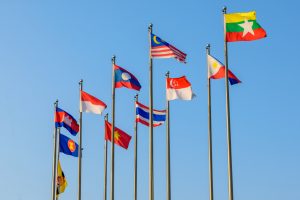On December 19-20, Thailand will host regional representatives in their latest meetings on the Myanmar crisis. Neighboring countries will first come together to discuss border security with the Myanmar junta’s minister of foreign affairs, Than Swe, followed by a meeting of foreign ministers from the Association of Southeast Asian Nations (ASEAN).
There were no reports of representatives of the opposition National Unity Government receiving an invitation, despite ASEAN’s stated commitment to constructive dialogue among all parties in pursuit of “Myanmar-owned and -led peaceful and durable solutions.”
Broad, official engagement with a high-level junta representative is an implausible response to the deteriorating human rights situation in Myanmar. Amid growing territorial losses to opposition armed groups, the military has ramped up its “scorched earth” tactics against civilians. The junta’s expanded aerial and artillery operations have resulted in bombed schools, displacement camps, and medical centers. Civilians describe living in fear of arrest, torture, and military attacks.
For a truly “Myanmar-owned and -led” solution, regional governments should be centering efforts toward dialogue and peacebuilding on the voices of the people of Myanmar, not a junta responsible for ongoing war crimes and crimes against humanity.
ASEAN continues to cling to its failed Five-Point Consensus (5PC), despite acknowledging its “concern on substantially inadequate progress in the implementation of the 5PC” at its October summit. The agreement – inked in April 2021, less than three months after Myanmar’s military coup, and immediately disregarded by the junta – will be discussed at the foreign ministers meeting on December 20.
ASEAN’s endorsement of the Bangkok talks, with the imprimatur of Indonesia, Laos, and Malaysia as the past, current, and future chairs, or “troika,” signals misguided efforts to salvage the bloc’s weak and stagnant Myanmar strategy.
When Thailand previously hosted junta foreign ministers at dialogues in December 2022 and June 2023, Indonesia, Malaysia, and Singapore declined to attend, criticizing the talks for undermining ASEAN’s response, which includes a ban on “political” representatives of the junta at high-level meetings.
The declined invites underscored the fault lines that had emerged within the bloc’s Myanmar response between the more vocal members urging stronger action and those unwilling to isolate the junta – chief among them Thailand. Indonesia, then-ASEAN chair, said of its absence in June 2023 that the bloc had arrived at “no consensus to reengage or develop new approaches,” while Singapore called engagement with the junta “premature … even at a foreign minister level.”
Why then did Malaysian Prime Minister Anwar Ibrahim, next year’s ASEAN chair, indicate renewed engagement with the junta at a news conference on December 16 with Thai Prime Minister Paetongtarn Shinawatra? “We are taking measures through dialogues informally at different levels to ensure that Myanmar do participate [sic] and bring back Myanmar to the full of ASEAN,” Anwar said.
Labeling the engagement as “informal” does not limit its harmful potential to legitimize the junta or undermine the work of Myanmar democracy activists.
An overhaul in ASEAN’s approach to Myanmar is clearly needed, but tilting toward the junta is the exact wrong direction, further undercutting the bloc’s credibility and widening its trust deficit among Myanmar communities.
To address the Myanmar crisis, ASEAN members, China, India, and others joining the dialogues should be looking to ramp up pressure on the military to end its abuses, not hosting a junta official whom the European Union has sanctioned for “undermining democracy and the rule of law in Myanmar.” True leverage will require developing tangible, timebound consequences for the junta’s violations of the Five-Point Consensus as well as international humanitarian and human rights law, in consultation with other governments, such as those with sanctions regimes.
Thailand has similarly not presented a consistent, cohesive strategy on its neighbor’s unraveling, despite claiming to be a key broker in the conflict, even through its own political upheaval.
Rather than courting diplomatic dead ends, Thai leaders should focus their energy toward areas that can tangibly benefit the people of Myanmar: ending exploitation, extortion, and forced returns of Myanmar asylum seekers; combating growing xenophobia and anti-Myanmar sentiment on and offline; channeling cross-border aid through community-based groups; blocking all weapons sales to Myanmar in line with the 2021 U.N. General Assembly resolution; and instructing Thai banks to stop financial transactions involving sanctioned junta entities.
As chair in 2025, Malaysia should reroute ASEAN’s approach in line with the tougher rhetoric it has previously espoused, supporting both punitive and diplomatic measures from a coalition of concerned governments. It should welcome a follow-up resolution imposing a global arms embargo by the U.N. Security Council, which has asserted “its full support for ASEAN’s central role in facilitating a peaceful solution.” And it should engage, formally and consistently, with Myanmar civil society, affected communities, and opposition figures.
Just six months ago, Malaysia’s Anwar voiced support for “multipronged, more creative tracks” on Myanmar. “Failure to act,” he said, “when there is ample cause to believe that a member state is violating the spirit of the ASEAN Charter, is a dereliction of our moral duty.”

































